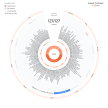Momentum softens: On S&P Global’s survey
Momentum softens: On S&P Global’s survey

Food inflation threatens to undermine efforts to ensure price stability
The latest Purchasing Managers’ Index (PMI) for India’s manufacturing sector and the Services
Business Activity Index for the economy’s broader services sector from S&P Global, posit a softening
in momentum in economic activity. Its survey of about 400 manufacturers shows that production
growth at major private sector factories eased marginally last month, with the June PMI reading
dipping to 57.8, from 58.7 in May. On the services front, the index signalled the expansion in output
decelerating to a three-month low, dragged down by activity in the transport, information and
communication sectors registering a sequential slowdown. The softer readings of the manufacturing
and services indices for June can be attributed to a large extent to their multi-year peaks in May and
April, respectively, especially when the underlying constituents of the index are viewed separately.
While manufacturing PMI surged to a 31-month high in May, the index for services had in April
registered its highest seasonally adjusted figure in almost 13 years. June’s data show that new orders
at factories, which constitute about 30% of the manufacturing PMI’s weight, grew at the strongest
pace in 28 months, while demand and higher labour costs spurred charge inflation — the rate of
increase in prices of manufacturers’ finished goods — to a 13-month high. Similarly, service providers
noted a quicker expansion in intake of new business, pointing to demand remaining robust, and
buoying firms’ confidence in growth prospects to the highest level in 2023.
On the face of it, S&P Global’s survey findings ought to reassure policymakers that the Reserve Bank
of India’s inflation-battling interest rate increases till the end of the last fiscal have still not sapped
domestic demand for manufactured goods and services. However, the PMI survey panels do not
include MSMEs, which collectively are estimated to contribute more than a third to the gross value
added generated by the manufacturing sector as a whole. The absence of data on the MSME
segment, which is a key bulwark of manufacturing employment, means that estimating the overall
strength of job creation in the formal economy relying largely on PMI as an indicator may be risky.
While S&P Global’s surveys point to private sector employment strengthening further, with
manufacturers recording a stronger expansion in jobs than service providers, CMIE data point to the
June unemployment rate having spiked to 8.5%, from 7.7% in May. Policymakers will also need to
keep a watch on the upward trend in output prices at manufacturers and service providers, given that
the resurgence in food inflation threatens to undermine the RBI’s efforts to anchor inflation
expectations and ensure growth-supportive price stability.
Summary of the Editorial
1. The latest Purchasing Managers’ Index (PMI) for India’s manufacturing sector and the Services
Business Activity Index from S&P Global suggest a softening in economic momentum.
2. The survey, conducted among 400 manufacturers, shows marginal easing in production
growth in June, with PMI reading at 57.8, down from 58.7 in May.
3. The Services Business Activity Index signals a deceleration in output expansion to a three-
month low, with the transport, information, and communication sectors experiencing a
slowdown.
4. The softer readings of the manufacturing and services indices for June can be attributed
largely to their multi-year peaks in May and April respectively.
5. Manufacturing PMI had surged to a 31-month high in May, while the services index registered
its highest seasonally adjusted figure in almost 13 years in April.
6. June’s data reveals that new orders at factories, making up about 30% of manufacturing PMI's
weight, grew at the strongest rate in 28 months.
7. Demand and higher labor costs spurred charge inflation — the rate of price increase for
manufacturers' finished goods — to a 13-month high.
8. Service providers experienced a quicker expansion in new business intake, indicating robust
demand and boosting firms' confidence in growth prospects.
9. S&P Global’s survey findings should theoretically reassure policymakers that the Reserve Bank
of India’s inflation-controlling interest rate increases have not dented domestic demand for
manufactured goods and services.
10. However, PMI survey panels do not include Micro, Small and Medium Enterprises (MSMEs),
which contribute significantly to the gross value added generated by the manufacturing sector.
11. Absence of data on the MSME sector, a crucial source of manufacturing employment, suggests
that relying solely on PMI as an indicator may not give an accurate representation of job
creation in the formal economy.
12. S&P Global’s surveys indicate private sector employment strengthening, with manufacturers
recording a stronger expansion in jobs than service providers.
13. Contrarily, Centre for Monitoring Indian Economy (CMIE) data suggest that the unemployment
rate increased to 8.5% in June, from 7.7% in May.
14. Policymakers need to monitor the upward trend in output prices at manufacturers and service
providers.
15. The resurgence in food inflation could threaten the Reserve Bank of India's efforts to anchor
inflation expectations and ensure price stability conducive to growth.






Comments
There are no comments for this story
Be the first to respond and start the conversation.